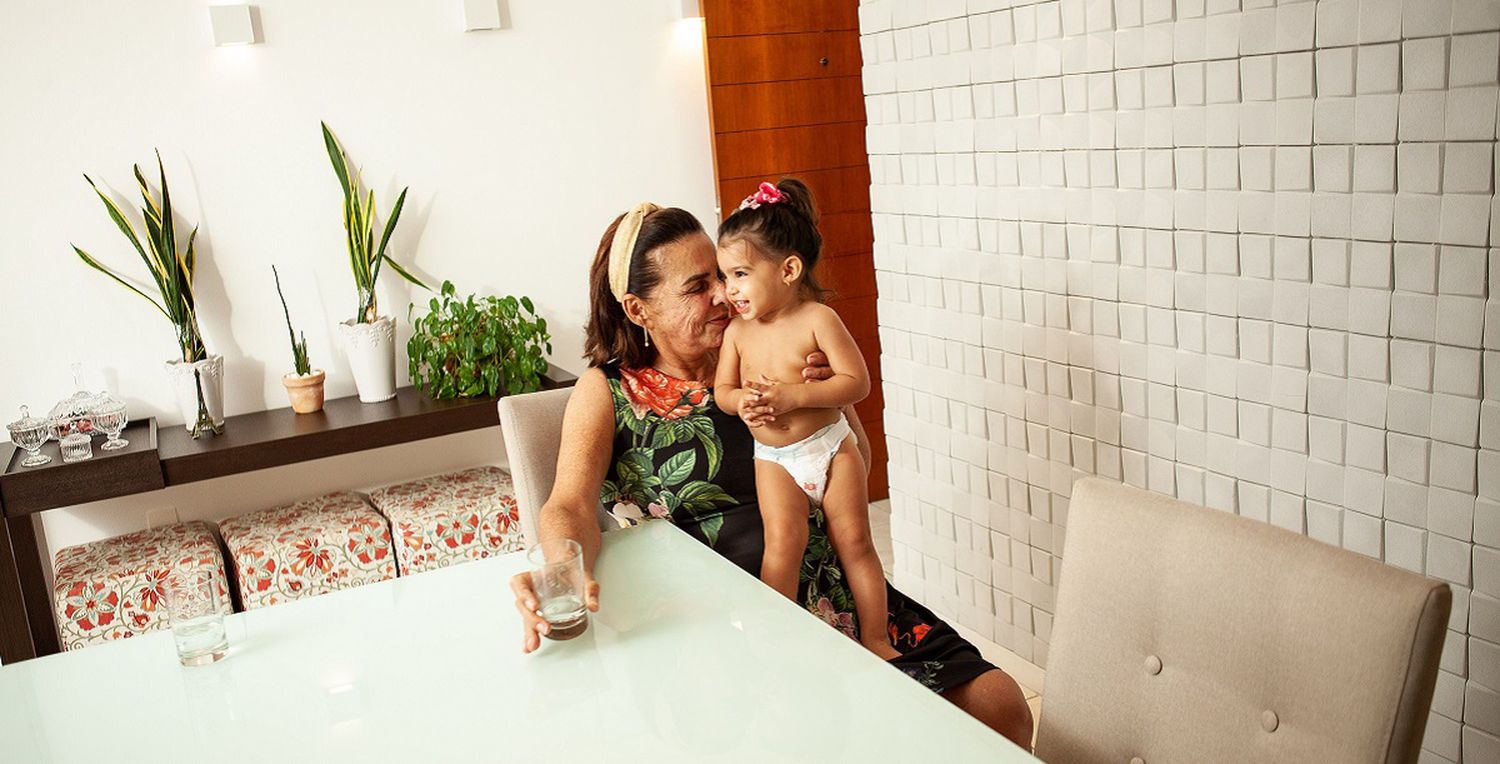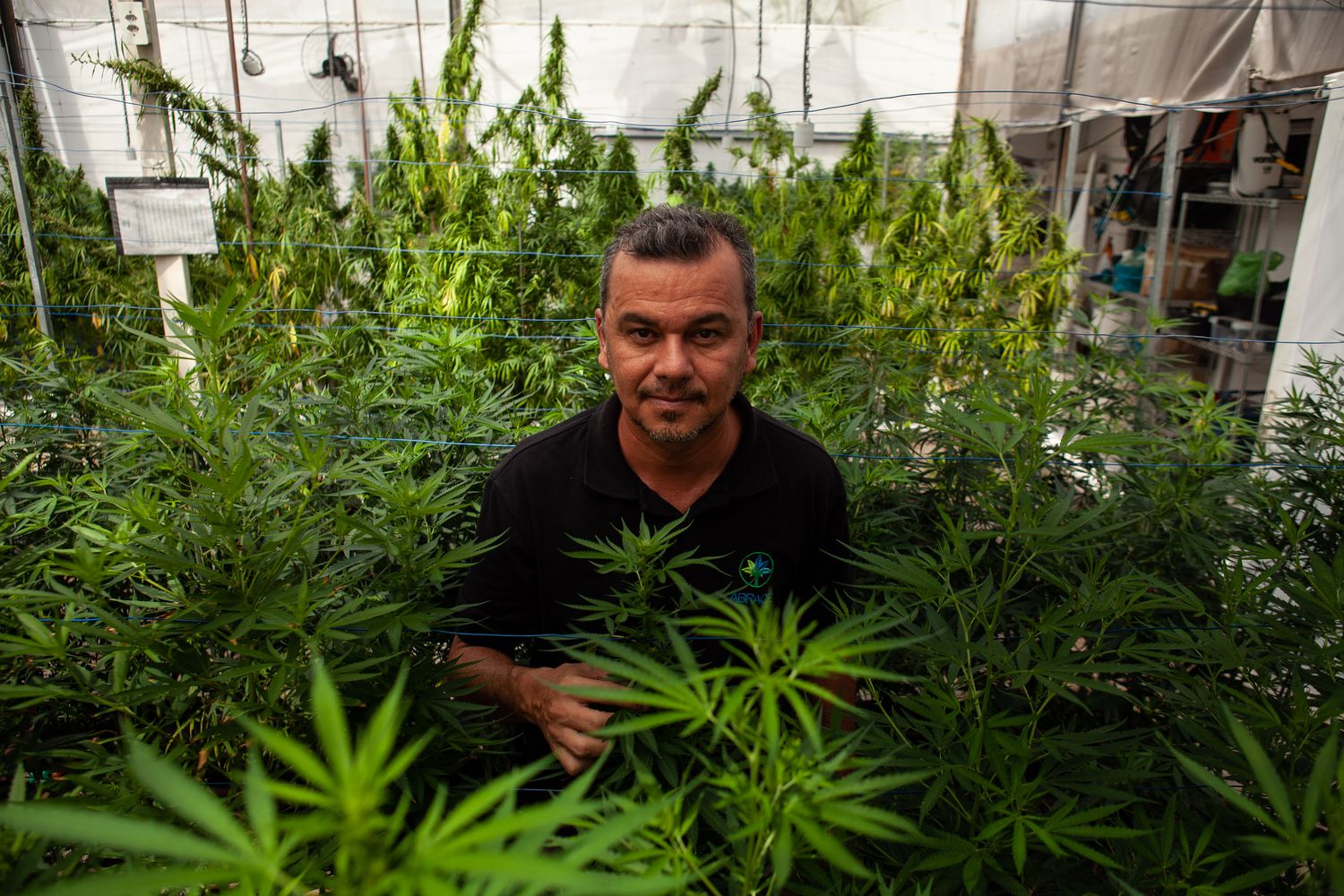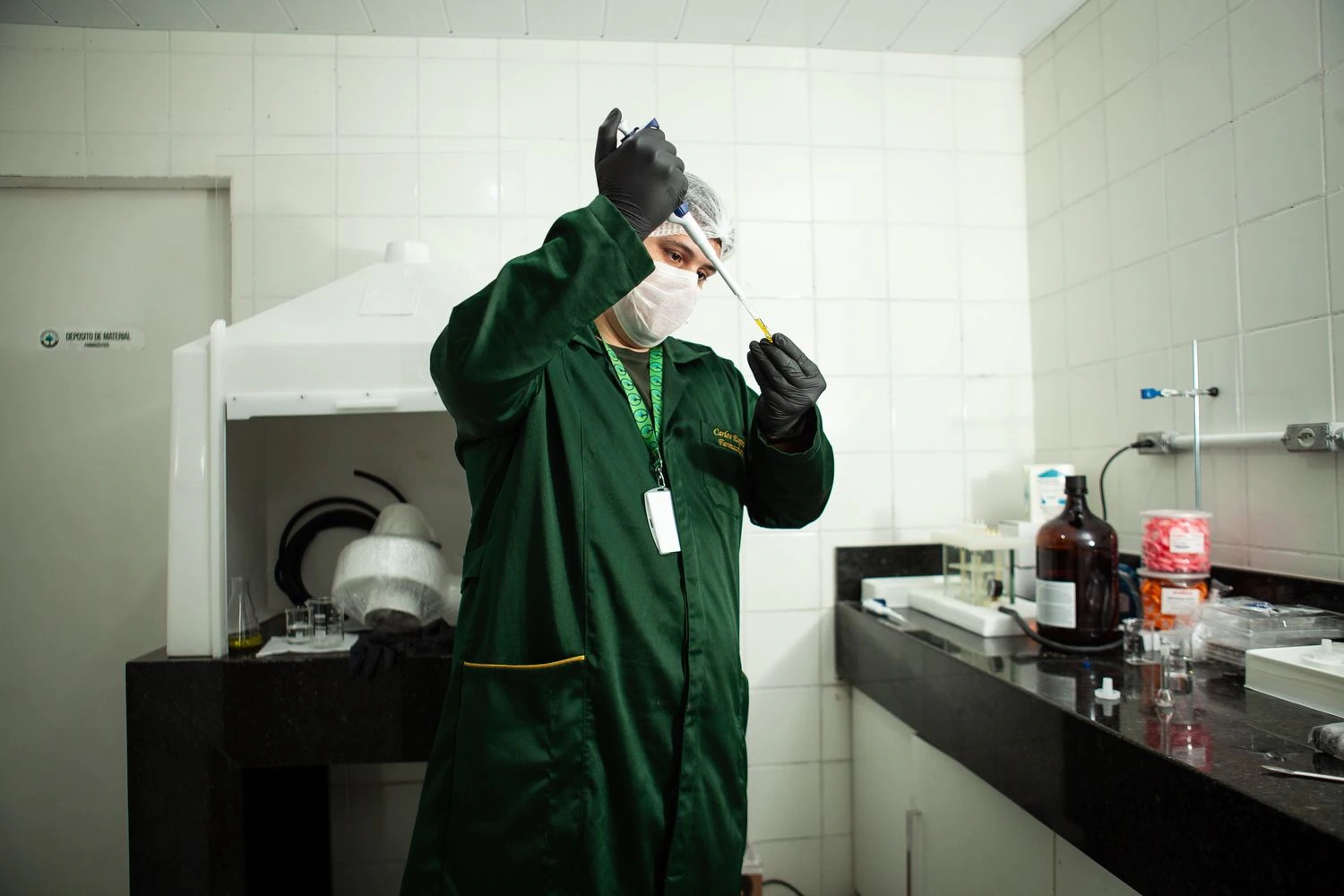RIO DE JANEIRO, BRAZIL – “I never thought about suicide. But the truth is that I was already killing myself inside,” tells retired teacher Zeza Araújo, 63, about how she felt during the near decade in which she suffered from depression. “I took so much medication that I can’t even remember. Until one day my doctor told me ‘I don’t know what else to do for you. I’ve given you everything and you aren’t getting any better'”.

It was then that her children persuaded her to take cannabis oil. “I didn’t want to. I cried and said: but am I going to take marijuana now? I was prejudiced.” Today she proudly shows the bottle of oil she’s been taking for almost a year. “God sent me cannabis,” she says, with her one-year-old granddaughter on her lap.
Zeza is one of 3,200 patients currently treated with cannabis oil produced and marketed by the Brazilian Cannabis Hope Support Association (ABRACE), the only one in Brazil with this authorization. The organization, founded in João Pessoa, capital of Paraíba, by Cassiano Teixeira, 46, was illegal for almost three years until a court granted it an injunction in April 2017.
Today, the 2,000 marijuana plants at the association’s headquarters produce up to 4,000 liters of oil per month, used for the treatment of conditions such as Parkinson’s disease, Alzheimer’s, epilepsy, depression, and cancer, not only in humans but also in animals. “I started importing illegally to treat my mother, who had cancer and was disillusioned by doctors,” Teixeira says. “My siblings were angry because they said I was giving drugs to mommy. Today they all use the oil”.
In the small waiting room at the ABRACE, five tables with receptionists sign up patients who come from different locations. There are also those in charge of the telephone and financial services, of dispatching the orders to the whole country, the pharmacists and researchers from the laboratory and the growers in the greenhouses. Almost 40 employees work in the business. “We’re moving headquarters because we can’t fit this many people here anymore,” says Teixeira. In the waiting room, a lady does crochet while waiting for her turn and an elderly couple hold in their hands a bag with the imprint of a medical laboratory.
“In general terms, those who seek cannabis have already tried many other allopathic treatments,” explained Gabriel Andrade, 30, a family and community doctor, who carries out treatments at a João Pessoa health center and, in some cases, prescribes cannabis. He says patients themselves come informed about the plant’s therapeutic application. “People want to use it, the demand is very great, and for different problems,” he says. “But the access is difficult, they think it’s something that’s too far out of their reach. And often it is.”
Today, access to the medicine has two paths: one is through ABRACE, which charges R$150 (US$36) to R$550 for the oil bottle, depending on the amount and concentration prescribed by the doctor. In addition, one must associate to the organization and pay an annuity of R$350. The other path is importing the oil, which requires an authorization from the National Health Registration Agency (ANVISA ), in addition to reports and a request from an authorized physician to prescribe the medicine.

Marijuana in shampoo
But it wasn’t always like this. “We went into international drug trafficking for Pedrinho,” says Sheila Geriz, 45, a civil servant, and mother of Pedro Américo Geriz Pinto, ten years old, an epileptic. “From three months to four years old, he was a little vegetable in a wheelchair, only drooling and convulsing”.
It was then that the family sought information on the use of marijuana in the treatment of epileptic seizures, which, according to her, amounted to dozens a day. “I went to a doctor who laughed in my face. She said the boy was going to get stoned. He took 16 pills a day and she worried about him getting high on marijuana”.
At that time, importing the drug was not even permitted. “We bought the oil in the United States, sent it to a friend in the country, who put it in syringes and sent it to us in a box filled with pens to disguise it,” she says. But in a matter of months, the Federal Police retained the order. “We lost R$13,000 because I was already buying for nine other children. All illegally.
Desperate and unable to import the oil, the parents, who by then were already organized in a group, tried other means. “There was a mother who even brought the oil from Ireland, in shampoo bottles,” says Sheila. The Cannabis League was born from the group, an organization also in João Pessoa that conquered the right to import the marijuana oil in court.
Today, Pedrinho, who has been called in the street “the marijuana boy”, only takes the oil and no other medication. The boy walks and has been seizure-free for months. Sheila herself, who is president of the League, uses the oil for arthritis pain. “Almost everyone at home is a pothead,” she says, laughing.
Caution is called for
But one must be cautious about this “miracle” to which many patients refer when speaking of marijuana. Although the use of cannabis in the treatment of epilepsy and seizures is now more widespread, it is not possible to claim, scientifically, that the plant is suitable for as many diseases as its proponents claim.
“We still lack more solid studies to be able to use cannabis in psychiatry more routinely,” says psychiatrist Rodrigo Martins Leite, director of institutional relations at the Institute of Psychiatry of the Clínicas Hospital in São Paulo. “At the same time, there is a reluctance in universities in Brazil to study and determine what disorders cannabis is useful for. This reluctance delays the drawing of more accurate conclusions”.
Although he is authorized to prescribe marijuana medication, Leite is thoughtful. “In psychiatry, we have seen efficacy in autism and anxiety disorders, such as panic disorder,” he says. “But in the case of depression, it’s still shady, there are people who improve and others who experience a worsening picture. So I don’t agree with this panacea, that marijuana can cure everything. It’s not like that, there must be limited therapeutic uses,” he says.

The “gold rush for cannabis”
Hairdresser Débora Guilherme de Oliveira, 27, left Livramento, in the interior of Paraíba, to seek help in João Pessoa, which has been called “the Brazilian California”. “I have been on a pilgrimage for three days,” she said, with a folder containing documents such as a prescription and medical reports in her hands, and two eyes on her daughter, Nauany Victoria Guilherme Sales, a 7-year-old autistic, epileptic and with a heart malformation.
Alone, without the child’s father around, she says she can no longer hold the girl when she has a seizure or an outburst. “She’s already taking the maximum dosage of medication, which causes her anxiety. So she wakes up around three in the morning and only sleeps again at night,” she says. According to her mother, Nauany has only one intact kidney, due to the amount of medicine already taken. That is why she claims to have so much hope in cannabis. “I think it’s going to be a turning point in her life.”
Débora followed Sheila, who, in turn, says she followed another mother when she began to seek help for her son’s cannabis-based therapy. It is through these searches that the networks are forming all over the country. There are dozens of organizations and associations, made up primarily of parents, organized in favor of the use of marijuana for medicinal purposes and that fight in the courts for this right. Sheila says the Cannabis League has police officers, detectives and judges among its members. “Disease is not selective,” she says. The organization’s next step is to achieve the right to grow marijuana at home for their own oil production. “Either we have the plant at home, or we won’t have access to it,” he says.
In 2015, ANVISA removed cannabidiol – one of more than 100 substances found in the Cannabis Sativa species – from the list of medications prohibited in Brazil. As production in Brazil is not allowed, the decision only paved the way for importing the substance. That same year, the Federal Supreme Court (STF) began discussing decriminalization of marijuana use. At that time, the Justices even discussed the amount of marijuana plants people might have at home, but the trial has not been finalized to date.
Late last year, ANVISA released the sale of cannabis-based drugs in a pharmacy. The decisions, although encouraging discussion about the therapeutic use of the substance, do not necessarily translate into accessibility, since it is not yet known at what cost these drugs will reach Brazil. According to Sheila, the decision is “terrible” because it does not acknowledge the work that patients and organizations have been conducting in Brazil for years. Rather, it privileges those with greater purchasing power to buy the drug and ignores the climate and fertile soil for growing in Brazil. “It’s an attack on national sovereignty”. “It’s no use dealing with marijuana like Tramal [a painkiller] because it’s not. And that’s why it won’t work to sell it in a pharmacy”.
Cassiano Teixeira, of the ABRACE, believes the decision is a small step forward, but in practice, it changes little in terms of accessibility. “Now the gold rush for cannabis will begin in pharmacies and laboratories,” he says. Rodrigo Leite argues that the barriers of prejudice need to be removed for the medicine to progress. “We have reached a limit in relation to traditional medicines. If we are not bold and incorporate other substances, we will be stagnant”.
In the case of retiree Zeza Araújo, prejudice was shattered as soon as she began to improve. “Before, the best time of day was when it got dark because I could close everything up and go to sleep,” she says. “Not today. I do gymnastics, I study philosophy, I got involved with volunteer work in church and last year I traveled to three countries. I had plenty of harms, but cannabis only did me good”. She says she doesn’t take any other medication and that she only uses the oil once in a while. “I tell in church that I use it and I say it’s a normal plant. I don’t know why it’s not legalized”.
Source: El País

